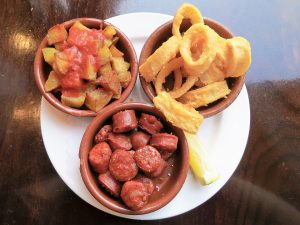
A few months ago, we posted about the benefits of student-centered paired speaking activities on Extempore. There are a ton of reasons to promote these sorts of activities in your classroom, but the most convincing one of all, I think, is that they give the teacher a snapshot of his/her students' authentic spoken abilities at a given point. These activities feel real to students and, though they may be challenging, they oftentimes lead to a fun time in (or out of) the classroom.
It's been a while since our last post about this, so I thought it might be nice to give another example, just to keep the activity ideas flowing.
This Extempore-based speaking task takes place at a simple restaurant or maybe some other target-language-specific eatery, such as a "soda" in Costa Rica, or a "bouchon" in Lyon, France to boost the cultural component of this activity. And then, to ground the students and keep them honest, I provide them with some requirements or criteria to meet in order to practice the course content:
- Food & cuisine vocabulary (items that might be ordered at the restaurant/eatery)
- Restaurant vocabulary (utensils, table settings, ordering/requesting, menu, etc.)
- Adjectives to describe food or dishes or the atmosphere at the restaurant
- At least one grammar point (so as not to overwhelm students) that's relevant for the task. Maybe ask students to use the target structure that is used to indicate tastes/preferences, such as gustar in Spanish or other structures, such as the conditional to practice making polite requests.
- A handful of useful fixed expressions (such as "bon appétit", or "check, please!").

And like I mentioned last time, I always think giving students (or asking them to invent) a specific problem to resolve is a good way to generate real conversation. Here are some ideas:
- A rude waiter is ignoring a table because he doesn't think the customer there speaks the language well.
- A clumsy waiter spills food in a customer's lap and must apologize profusely.
- A customer realizes that he/she doesn't have enough of the local currency to pay for his/her meal.
- A customer is unhappy because he/she keeps receiving the wrong dish.
- The customer's credit card is declined even though he/she insists that it's the restaurant's mistake. An argument ensues.
- The customer is overcharged for the meal and must attempt to politely call the waiter's attention to it. The waiter denies the problem.
- A demanding customer has an extensive list of food specifications for his/her order and none of the offerings on the menu are acceptable. The waiter is not happy.
- A customer and his/her sit down for a meal. The date proposes to him/her while the surprised customer attempts to politely say "no".
- A customer and his/her blind date sit down for a meal and he/she quickly realizes that he/she is on the worst date ever.
- For true beginners, just give them a simple restaurant scenario in which they successfully order a dish at a restaurant (no strings attached!).
- Emphasize a cultural phenomenon particular to the language you teach. In my Spanish class, I might ask students to imagine a scenario in which an American is trying Spanish tapas for the first time at a traditional tavern or bar.

Our students are pretty creative and they might even come up with a better idea if you let them brainstorm in class together before getting started.
Give them some time in class to prepare, or maybe assign the prep work for homework. Then, in class give them ample time to work through the scenario a few times before they record their final version on Extempore and submit it to you. (And don't forget, if your students are up for it -- and they usually are -- it's a ton of fun to play the finished products back to the entire class for a bit of fun and laughter.)
Admittedly, these sorts of activities can be difficult tasks, especially for beginning and intermediate students, so if you're thinking of assigning it, it may be best to consider it a summative assessment given near the end of a particular unit, especially if it ties together a bunch of different vocabulary, grammar, and cultural lessons.


